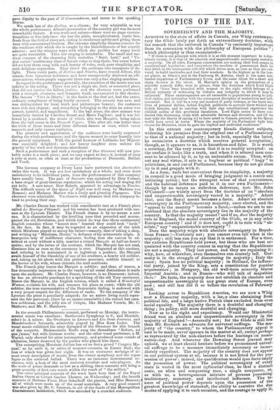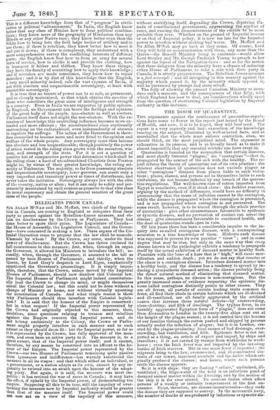TOPICS OF THE DAY.
SOVEREIGNTY AND THE MAJORITY.
APROPOS to the state of affairs in Canada, our Whig contempo- rary the Globe lately put forth an extraordinary doctrine, with the remark that the outbreak in Canada "is eminently important from its connexion with the philosophy of European politics" ; which philosophy is thus enunciated—. " If there is one principle with which it is at this moment important to indoc- trinate society, it is that of the absolute and unquestionable sovereignty vested in a majority. On all sides, European communities are making their first essays in constitutional legislation; and everywhere the machine of government finds its first hitch in the intemperate self-will which drives men, as soon as they are out- voted, to build barricades and load their muskets. In the highest as in the low,. est places, at Omuta and in the Faubourg St. Antoine, there is the same hot- headed impatience of Parliamentary forms, and the same thirst for a short and sharp decision in the street. M. Marrast's opinion on the pretensions of a minority scarcely differ, even in phrase, from the doctrines which Lord Elgin tells us have been broached with respect to the right which belongs to British minority of redressing by violence any indignity to which it may be subjected.' These extravagancies are all excusable in populations young to poli- tical rights, and unfamiliar with the consequent discipline of moderation and self- command. But it will be a very sad moment if party violence, or the baser mo- tives of personal dislike, induce English publicists to accredit these wicked and foolish heresies, and to sanction with their ripe constitutional experience the childish sallies of this provincial fanaticism.. Lord Elgin seems to have con- ducted this distressing crisis with admirable fairness and discretion, and (if we may take the liberty of saying it to have acted in Canada precisely as his Queen would have acted at home. Where the majority of his Parliament bade him choose his Ministers, there he gave his implicit and undivided confidence."
In this extract our contemporary blends distinct subjects, widening his premises from the original one of a Parliamentary to that of a national majority ; but in both, especially the latter, he enunciates a doctrine which receives general acceptation; though, as it appears to us, it is hazardous and false. It is worth a scrutiny, for the very reason that it is so readily accepted: on the surface it looks like a truth, and when it is uttered men con- sent to be silenced by it, as by an undeniable axiom. Thus, with- out any real virtue, it acts as a bugbear or political " bogy" to politicians, in and out of Parliament, because they do not go close up to it and grapple with it.
As a form, rude but convenient from its simplicity, a majority in council is a good mode of bringing judgment to a centre and initiating action ; but the strongest sense of that convenience, and the habitual deference paid to it in our own Parliament— though by no means an unbroken deference, tests Mr. John O'Connell—are widely apart from the doctrine of an " absolute and unquestionable sovereignty vested in a majority." Admit that, and the Royal assent becomes a farce.. Admit an absolute sovereignty in the Parliamentary majority, once elected, and the "appeal to the country" becomes a farce,-=unless we are to un- derstand that the absolute sovereignty lies in the majority of the country. Is that the majority meant ? and if so, does the majority rule in England, the model country of the Gloie, or in any other European country ? and if it does not, ought it to rule with "ab- solute," nay 0° unquestionable sovereignty"?
Does the majority reign with absolute sovereignty in Repub- lican France ?—Certainly not ; you cannot even tell what is the majority ; still less can you say that it is enthroned. For a time, the extreme Republicans held power, but those who are best ac- quainted with the country concur in saying that the Republicans are not a majority. They lost power, and they are regaining it ;
why, how, or wherefore, even themselves can scarcely tell. Ger- many is in the struggle of discovering its majority ; Italy the same ; Spain has no political majority ; in Holland, the influen- tial party, joined by the King, sets a constitution for popular acquiescence ; in Hungary, the old well-born minority braves Imperial Austria • and in Russia—who will talk of majorities there? De facto, majority does not establish its absolute and unquestionable sovereignty in any great state of Europe, even now ; and still less did it so before the revolution of February 1848.
Looking across to Republican America, we see now a Whig now a Democrat majority, with a large class abstaining from political life, and a large native Pariah class excluded from even social equality. The majority there is a doubtful and changing thing ; its policy, still more doubtful and changing. Now as to the right and expediency. Would our Ministerial friend vest an absolute and unquestionable sovereignty in the majority of England ?—Assuredly not; for the Globe is still less than Mr. Roebuck an advocate for universal suffrage. The ma- jority of "the country," to whom the Parliamentary appeal is said to be made, never appears in the matter at all, except perhaps as represented by the non-electors before the hustings on nomi- nation-day. And whatever the Downing Street journal may uphold, we at least should hesitate before we pronounced univer- sal suffrage to be a• measure immediately necessary or imme- diately expedient. The majority of the country does not appear in our political system at all, because it is not fitted for the pos- session of power : indeed, the qualification would ipso facto imply the possession of power. The political sovereignty ,of every state is vested in the most influential class, be that a distinct caste, an alien and conquering race, a single conqueror, or, as with us, a heterogeneous mixture of persons possessing traditionary, monetary, and intellectual influence. The te- nure of political power depends upbn the possession of the greatest knowledge of statecraft, the ability to contrive the due modes of applying it to each occasion, and the courage to apply it. This is a different knowledge from that of "progress" in civili- zation or political "advancement." In India, the English know better that any class of Hindus how to form political combina- tions; they know more of the geography of Hindustan than any Hindu or any other Native race ; they know better even than the Sikhs how to bring into the field large bodies of artillery and to use them; if there is rebellion, they know better how to meet it and put it down; if there is conspiracy, they understand with a more comprehensive survey the conflicting interests of different parts; the English know best how to form an army for several sorts of service, how to clothe it and provide the clothing, how to transport it hither and thither. They know these things ; they have the faculty of contriving how to apply their knowledge ; and if mistakes are made sometimes, they know how to repair mistakes : and it is by dint of this knowledge that the English, a very small minority indeed, rule the vast expanse of India, if not with absolute and unquestionable sovereignty, at least with irresistible sovereignty. It is true that no tenure of power can be so safe, so permanent, and so cheaply maintained, as that which obtains the sanction of those who constitute the great mass of intelligence and strength in a country. Even in India we are supported by public opinion. In England, no Government can brave the feelings and opinions of the great body of the people, non-electors as well as electors. Parliament itself dares not slight the non-electors. With the ex- tension of knowledge this controlling influence becomes mare ex- tended and more efficient ; the unenfranchised class continually encroaching on the enfranchised, even independently of statutes to regulate the suffrage. The action of the Government is there- fore compelled to become more and more fitted to the opinion and welfare of the whole people. Any sovereignty must thus become less absolute and less unquestionable; though positively the power of action vested in the ruling class grows with the resources, wis- dom, and strength of the state. For it is not a question of positive but of comparative power that determines which shall be the ruling class : a knot of unenfranchised Chartists from Preston might be, by virtue of their greater knowledge, the ruling mi- nority at Timbuctoo. The majority, so far from possessing absolute and unquestionable sovereignty, never governs, can assert only a very imperfect and transitory power at times of disturbance, and never takes the initiative. Sovereignty always lies with the elite of the country, native or alien ; but it can only be safely and per- manently maintained by such courses as preserve to that elite class its moral supremacy and obtain the general sanction of the great mass of the people.



























 Previous page
Previous page